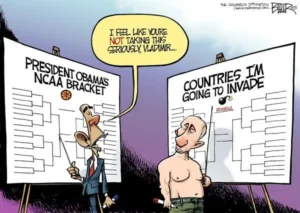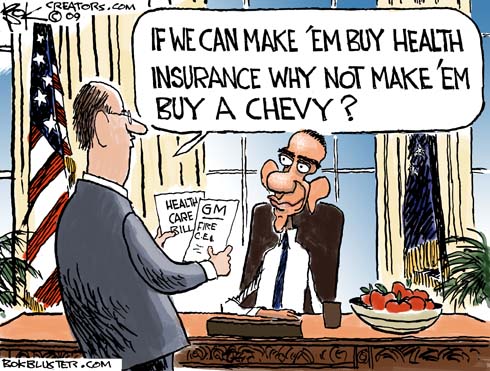 Wednesday, August 15, 2012
Wednesday, August 15, 2012
The next time the President or anyone running for high office drops a big number, would someone please ask him or her, “How do you know?” It’s a simple, entirely reasonable question. “How do you know?”
Yesterday, The White House announced that the cost of the President’s bailout of the auto industry has been revised upward. (The precise number isn’t important. The actual dollar amount of our losses isn’t what this piece is about.) Hearing that, I thought to myself, “Okay. Sure it’s a lot of money, but how many jobs did we save?” And then it occurred to me. There’s no way to know. Not really.
We know that President Obama takes credit for the success of the bailout, where success is defined by the fact that General Motors and Chrysler are now profitable, while they were losing money before the bailout. “Way to go, Me!” the President tells us every chance he gets. …Really, President Obama?
No question about it, both companies benefited from substantial infusions of government-funded equity that the private sector could not yet justify investing. GM also benefited by declaring a Chapter 11 bankruptcy that enabled a restructuring of its union contracts and from significant cutbacks to its network of franchise dealerships. And Chrysler was taken over by Fiat, an Italian company. Both the bankruptcy and takeover could have happened without the bailout.
Okay, so precisely how many jobs did President Obama save? Various, huge numbers have been used by the President and his supporters. The basis of these claims is his belief, had GM and Chrysler gone out of business, that the jobs of everyone working for the auto industry, directly and indirectly, would have been lost. This assumption is the dictionary definition of “hype.” I don’t know what’s worse, that he might actually believe it, or that he knows it’s ridiculous, but makes the claim anyway on the hope that we’ll buy it. My principal concern is that it’s the latter, that he’s playing us for fools, assuming we won’t take the time to think about it. In any case, in the rush of a political rally or commercial, the numbers tend to make their intended favorable impression and go unchallenged. And that’s too bad.
So what’s wrong with assuming that, if we hadn’t invested billions into GM and Chrysler, they would have gone out of business and a great many jobs would have been lost? The problem is an absence of a “control.” You know what I’m talking about. Add the word “group.” The “control group” is the patients, for example, who got a placebo instead of the real medicine the researchers were testing. Simply put, you can’t draw a conclusion about the impact of doing something, whether it is medicine or a bailout program, without being able to determine what would have happened if you didn’t do anything.
Sometimes “controls” are carefully designed elements of an experiment. Other times, particularly in the real world of a live economy, we have to settle for an understanding of relevant history. We don’t have, for example, two GMs and two Chryslers so that we can give one set bailout money and let nature take its course for the other set, and then compare the results. The best we can do ask ourselves, “What usually happens when companies, even large companies, get into trouble and the government doesn’t bail them out?”
The answer is that, “It depends.” If there is a continuing market for the product or services the troubled company makes – cars, in this case – and if the human resources, technology and facilities of the troubled company are worth preserving, reorganization will occur and/or new money and management will come in to do whatever it takes to save the company. If the troubled company isn’t worth saving, then it’s dismantled and that’s that. Either way, jobs are lost, but how many and for how long before they find work elsewhere, we have no easy way of knowing.
What do we know for sure?
We know that Ford and other, foreign auto manufacturers didn’t need bailouts. That tells us that there was something lacking at GM and Chrysler that Ford and other, better managed, more successful manufacturers had in place.
We know that the cars GM and Chrysler made and would eventually make, if not manufactured by those specific companies, would have been built by one or more other companies, by their current and newly hired employees.
We know that corporate failures in a free market economy are nature’s way of assuring economic growth, of updating the economy. What the bailout did was to intervene in that natural process. If anything, it’s larger corporations whose power and momentum are such that they persist without having to be as smart and innovative as they could be – and it was two of those giant companies, not to mention AIG and other firms in the financial sector, the President choose to support.
We know that the bailout of GM and Chrysler gave them a significant competitive advantage over Ford and other manufacturers that actually had to earn their success and choose not to hold us hostage with the threat of massive layoffs.
We know is that there were alternative applications of those same bailout funds that might have had a more substantial, more enduring impact on our economy and on employment in particular.
And we know that President Obama has no basis, short of wild-ass speculation, to assert that he saved even a single job – net of what the economy would have accomplished if he’d stayed out of it.
I’m glad he feels good about the bailout programs, about the billions of dollars we borrowed to prop up a handful of very large firms. (How is that different from being a private equity firm, like Bain Capital, except that the President lost money on our investments?) Personally, it’s not something I would brag about. Like anyone of us applying for a job, if you don’t have any real successes to list on your Presidential resume, you spin what you did as best as you can. And when you can’t spin enough, you make things up. With all this spinning going on, is it any wonder that the voter is dizzy and doesn’t know what to think? (I wonder if that’s the objective.)
What we don’t and will never know is what better outcomes there might have been in the auto and financial sectors had the President left well enough alone. If only he would believe more in the power and efficiency of a free market economy, despite its imperfections, and less in the duty and ability of government to save us from every problem we face.
And we don’t know, and won’t until late Tuesday, November 6, whether or not the argument that, “As bad as it the economy is, it would have been worse without me in The White House,” is enough to squeeze out an electoral college victory. Geez, I hope not.
-Next Contestant

